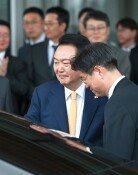China Joins U.S. in Condemning North
The U.N. resolution to sanction North Korea, which the UN Security Council (the UNSC) adopted on July 16, is expected to cause a stir in that it is the international community expressing serious concerns over the Norths missile launches in unison.
The resolution is likely to put significant pressure on North Korea because China, which has been friendly to Pyongyang, didnt abstain and voted on the resolution. China voted against adopting the resolution when the North launched the Taepodong 1 in 1998.
The resolution has provided the foundation for the international community to raise the level of sanctions on Pyongyang, depending on how the North responds.
What is the difference between the resolution Japan proposed on July 7 and the resolution the U.N. Security Council adopted? -
Chapter Seven of the UN Charter, which permits military measures, was omitted and the part that read: Pyongyangs act of launching missiles is a threat to global peace and security was also omitted. And the word decides, which is legally binding, was replaced by demands and requires.
If so, has the message the resolution delivers to Pyongyang weakened significantly? -
No, it has not. All 15 members of the UNSC agreed to adopt the resolution unanimously. Also, its contents are much more powerful than the resolution in which the UNSC urged Pyongyang to return to the Nuclear Non-Proliferation Treaty in 1993.
Is the resolution legally binding?-
It is hard to see it that way. The resolution the UNSC adopted during the Korean War had no reference to chapter seven of the U.N. Charter, but it was recognized that it was legally binding. The key is how each country carries out the resolution.
Can U.N. members take military measures against North Korea, according to the resolution?-
Military measures are not available because clauses invoking chapter seven of the U.N. Charter, which approve military actions, were deleted, and there are no clauses permitting the use of force in the contents of the resolution.
Then are sanctions against the North through military measures not possible? -
Yes, it is. It is possible if the UNSC adopts a new resolution containing clauses that approve chapter seven of the U.N. Charter and the use of military. It is highly likely for the U.N. to adopt the new resolution if Pyongyang launches additional missiles or performs nuclear experiments.
What clauses in the resolution can sanction North Korea directly? -
These are chapters three and four that restrict North Koreas exports and imports of materials, parts, products, and technology related to missiles or WMD. Especially, chapter four can stop transfers of financial capital Pyongyang can profit from exports related to missiles and WMD.
What sanctions can South Korea take, according to the resolution?-
The South can restrict inflows of strategic materials into the North. The South is already enforcing the clause, and the South Korean government announced that it will strengthen further its control of strategic materials.
Does the South Korean government plan to take other actions?-
None, except for proceeding with the six-party talks without Pyongyang, in addition to controlling strategic goods, as of July 16. The South Korean governments standing is to mediate between the U.S. and Japan, which want to strongly pressure the North, and Russia and China, and try not to provoke the North.
Can all U.N. members take sanctions against the North, according to chapters three and four? -
No. Chapters three and four contain the proviso, According to national laws and consistent with international law. If domestic laws have no provisions restricting sanctions for missiles and WMD or no relevant provisions, the nations concerned cannot or need not take sanctions. Also, the same goes for countries which didnt accede to international agreements such as the Wassenaar Arrangement for the prevention of exporting strategic materials needed for WMD production.
How did Pyongyang respond in the process of discussing the UNSC resolution?-
The South Korean government said that no particular actions were detected from Pyongyang. It is plausible that at first, Pyongyang stayed still due to trust in China, which has a veto on the resolution as a permanent member of the UNSC. Some analyzed that later, Pyongyang decided to ignore the resolution after China changed their standing to adopt the resolution.
Myoung-Gun Lee Yeon-Wook Jung gun43@donga.com jyw11@donga.com







